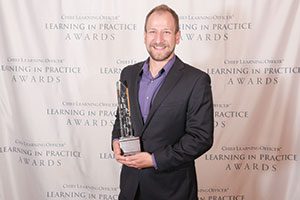Learning in Practice Awards 2016
For learning executives who have demonstrated exceptional business acumen combined with forward-looking vision to develop and execute a comprehensive learning strategy that clearly aligns employee development with broader organizational strategy.
DIVISION 1
 Michele Parks, Vice President, Talent Management, Cox Communications
Michele Parks, Vice President, Talent Management, Cox Communications
Cox Communications was facing a major transformation in 2014. To create a more unified company, it restructured its care, sales and collections operations, growing certain areas and phasing out others. For example, it scaled down from 19 call centers to five.
 Michele Parks, the company’s vice president of talent management, knew how important learning and development was to ease and accelerate this transition, which would ultimate impact 50 percent of the company’s 18,300 employees.
Michele Parks, the company’s vice president of talent management, knew how important learning and development was to ease and accelerate this transition, which would ultimate impact 50 percent of the company’s 18,300 employees.
A more unified workforce would benefit the company in the long run, but centralizing so many locations posed some challenges for the learning function. Each location had its own learning department, mostly classroom-led training on technological advancements and innovation. Parks wanted to bring Cox learning into the 21st century through a flexible e-learning platform that would be the same at all locations. By doing this, she could align learning to the organization’s needs and facilitate myriad changes.
Parks arose passion and commitment early by encouraging employees to “bring your juice” — that is, an attitude of fiery perseverance in the face of daunting tasks. As a result of a more modern learning platform and a more “juiced” employee base, costs decreased and employees enjoyed higher quality training across a more centralized operation. The e-learning courses also saved the company significant labor hours by cutting down training time. Finally, Parks helped create Cox’s Executive Learning Council to address and respond to the always-changing needs of the business and the workforce.
—Andie Burjek
 Michelle Braden, Vice President, Global Learning Excellence, TELUS International
Michelle Braden, Vice President, Global Learning Excellence, TELUS International
Attrition in the business process outsourcing industry can get as high as 90 percent for some companies. And TELUS International, like many of its peers, was having problems with employee retention.
Lead by Michelle Braden, global director of learning excellence, the company built a culture of engagement in its workforce — made up of more than 80 percent millennials — by providing learning and development opportunities, like the Learning@TI roadmap.
The Learning@TI roadmap offered a path for global employees from new hire to senior leader to move from one level of leadership to the next. Since its implementation, attrition has decreased 9 percent, and the roadmap helped prepare the next generation of leaders at a time when the company’s headcount grew by 30 percent.
—Andie Burjek
 Melissa Hess, Deputy Director, Crisis Management Training, Foreign Service Institute, U.S. Department of State
Melissa Hess, Deputy Director, Crisis Management Training, Foreign Service Institute, U.S. Department of State
Lead by Melissa Hess, the organization’s acting division director, the U.S. Department of State, Foreign Service Institute organized and delivered the first countrywide crisis management exercise in Mexico.
As a result of the exercise, 10,000 U.S. and Mexican employees of the U.S. Embassy are better trained and more prepared to deal with crises like hurricanes and other disasters, natural or man-made.
—Andie Burjek
DIVISION 2
 John Kostek, Learning and Performance Consultant, Hitachi Data Systems
John Kostek, Learning and Performance Consultant, Hitachi Data Systems
Big data, big problems — at least that’s the scenario if your company offers traditional storage solutions in modern times. Hitachi Data Systems, or HDS, saw how the digital revolution transformed its industry. It had to move beyond traditional methods to third-party platform systems, a modern solution for data capture, integration and analysis, in order to survive.
 To deal with disruptive industry changes, first HDS made strategic acquisitions and developed new technologies. Then, it pulled its sales team into the future. “If HDS is to successfully transition from a data storage company to a company providing modern IT infrastructure and analytic solutions, sales engineers (SEs) must be able to talk with customers about third-party platform systems and modern analytic architectures,” wrote Terri Casady, senior manager at HDS Academy in the LIP application.
To deal with disruptive industry changes, first HDS made strategic acquisitions and developed new technologies. Then, it pulled its sales team into the future. “If HDS is to successfully transition from a data storage company to a company providing modern IT infrastructure and analytic solutions, sales engineers (SEs) must be able to talk with customers about third-party platform systems and modern analytic architectures,” wrote Terri Casady, senior manager at HDS Academy in the LIP application.
Under the leadership of John Kostek, the company’s learning and performance consultant, HDS developed its first MOOC, which included video lectures, lab assignments and writing and presentation assignments. Kostek also designed additional training for a select group of SEs that used the MOOC material along with mentoring, sales call shadowing and a boot camp. He led every step of the process, from deciding which topics to cover to reviewing lecture materials and hosting meetings with SE participants.
So far, 25 percent of SEs have graduated. They’re more skilled at selling the more-modern product. They can more effectively run sales calls, and deliver product overviews and complex analytics software demonstrations. One graduate already made a deal with a Spanish railway valued at 200,000 euros. Another closed a $400,000 deal with a U.S. bank.
—Andie Burjek
 Deborah McCuiston, Director of Learning and Organizational Effectiveness, Virgin America
Deborah McCuiston, Director of Learning and Organizational Effectiveness, Virgin America
Moving from a private to a public company in 2015, Virgin America faced a critical transformation. It gained more airplanes and a thousand more employees, and to meet this growth it had to invest in its people, find the right talent, and develop critical leadership skills within the organization.
Key to Virgin America’s strategy was talent development and employee engagement. Lead by Deborah McCuiston, director of learning and organizational effectiveness, to address the lack of core leadership skills, every leader in the company, including the CEO, participated in a program to develop their ability to lead teams and inspire and motivate others.
First, McCuiston led a core team of HR leaders who did a gap analysis of employee interviews and the current “employee journey” from recruitment on. Once the core team understood the employee experience, it defined Virgin’s “ideal culture,” and determined what leaders needed to do to support that culture.
Leaders ultimately redesigned the employee journey and changed their approach to talent and leadership development. Efforts to improve employee engagement and the employee experience have gotten very positive feedback.
—Andie Burjek
 Ann Marie Sidman, Vice President, Learning and Organizational Development, General Reinsurance
Ann Marie Sidman, Vice President, Learning and Organizational Development, General Reinsurance
To retain diverse talent in the incredibly competitive insurance industry, General Reinsurance created the unconscious bias training program. The learning function partnered with a workplace bias expert to identify, define and address the biases in the company culture and developed a library of videos for on-demand learning content.
Program participants are more prepared to address workplace bias, and Gen Re has seen significant growth in its female talent pipeline. Five women have been promoted to senior leadership positions, and the company appointed its first female CEO this year.
—Andie Burjek














